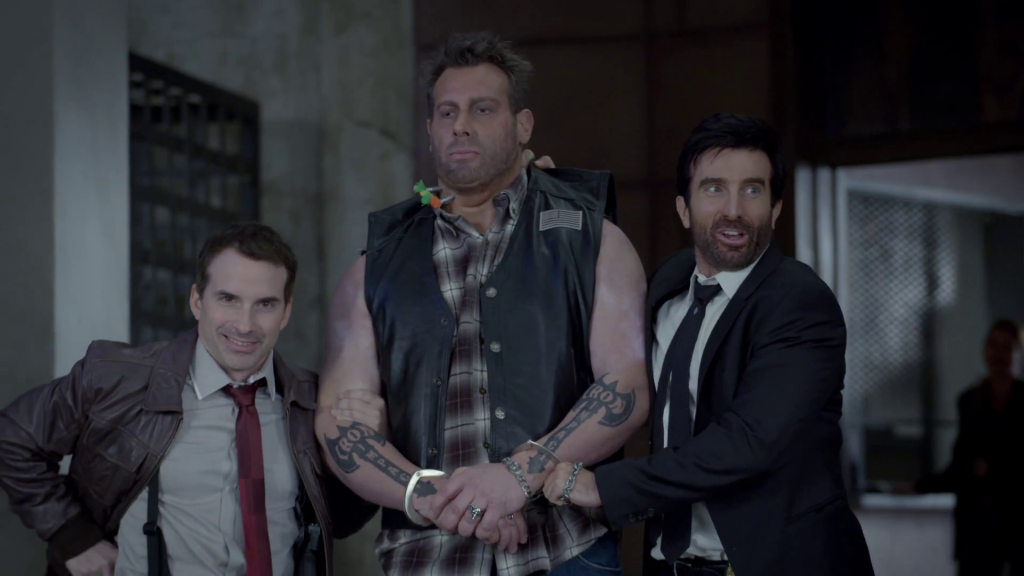
Powers should be a good show. The comic it is based on has an interesting premise, fun characters, a gritty violent tone, and more than a few adult themes and interesting critiques about modern society. So far though, much like the series’ main character, the PlayStation Network’s Powers show is starting out a mere shadow of what the series was in the past.
Quick review of the plot: the show is set in modern day Los Angeles and follows the Powers Department of the LAPD, the division specifically designated to investigate crimes involving super powers or super-powered individuals. The two main characters are Detectives Christian Walker (Sharlto Copley), a jaded senior detective, and Deena Pilgrim (Susan Heyward), the hotshot rookie in the division who respects Walker. They are called in to investigate the death of former superhero Olympia, whose heart exploded when he was exposed to a drug called Sway while an underage girl had sex with him. The drug is part of a conspiracy by super-powered criminal Johnny Royalle (Noah Taylor) to spread powers and create chaos so that he can rule the city through fear.
Ignoring all ties to the source material, if that description sounds like every single cop procedural cliché in the book, there’s a reason for that. On its own, the Powers pilot is a lazy, by-the-numbers cop procedural. The characters are stock, the plot is dull, and its superhero battles look like Syfy channel- quality CGI atrocities (luckily the fights are at a distance so they don’t have to try to render it in great detail). Worst of all, the dialogue in this series is so dull that I find it difficult to believe that Brian Michael Bendis, the creator of the original comic, was a writer on this dull waste of time, considering how great the dialogue is in the comics, particularly in comparison to this pilot. The only thing saving this pilot from being out-and-out bad is that the acting is pretty consistently good. Eddie Izzard as the main villain, Wolfe, is creepy and entertainingly unhinged, and Noah Taylor as the secondary villain, Johnny Royalle, is effectively slimy and creepy. I also like the way they handle his teleportation powers, with quick jump cuts keeping spatial continuity as well as an unpleasant but memorable popping sound that sticks in your mind after you hear it. Now, all of this is just an assessment of the Powers pilot on its own, and in that respect it is just a lazy traditional cop procedural with slightly more swearing than would be allowed on network television. Where Powers truly fails, is as an adaptation of Bendis’ comic series.
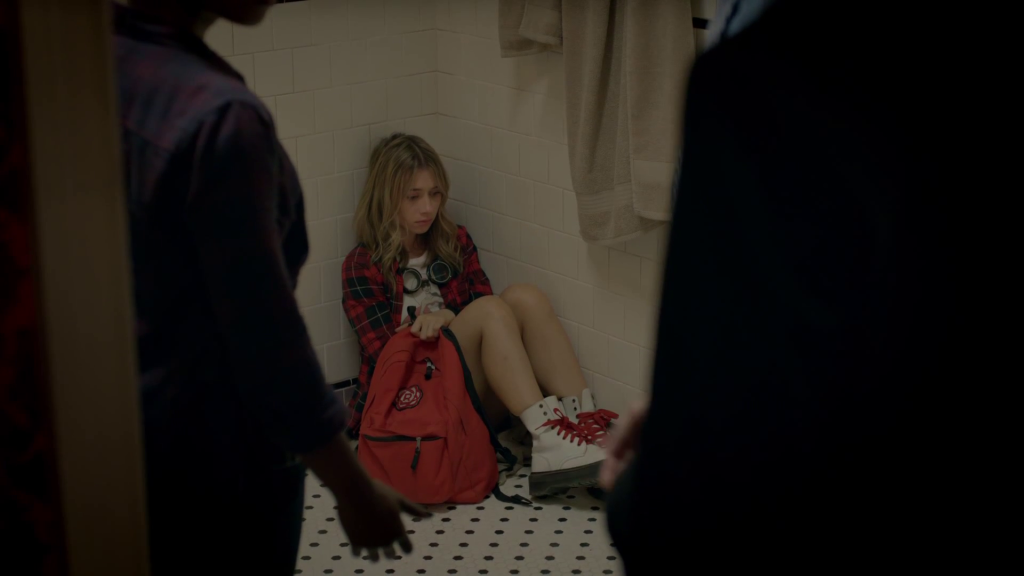
I realize that no adaptation is going to be a complete copy of the original, and that is a good thing because otherwise adaptation is a waste of time. However, when changes are made for an adaptation, they should be changes that keep what was great about the original while updating what doesn’t translate well to the new medium. Every change that the Powers pilot makes only serves to make the series and its characters less likable or less interesting. Christian Walker, instead of being a superhero who lost his powers and kept his former identity a secret in order to keep doing good, is now a burnt out former celebrity basically where everyone knows who he was and he trades on his former identity to score with younger women and tell nasty sex stories while whining about how much he misses his powers. This isn’t helped by the actor who’s playing Walker, Sharlto Copley, who isn’t a bad actor but lacks the charm and charisma to play a character like Walker who is kind of adorably awkward with women and a decent person dealing with the absolute worst of this inhumane world. In the case of Deena Pilgrim, Susan Heyward isn’t a bad actress, but the character is written to have almost no personality at all, versus the comic version where she is a crass, cynical, loud-mouthed, hot-headed police detective who wanted to work with Walker because she respects him in spite of her general cynicism towards being police in a world of superheroes. The same is true for a lot of the other characters. Calista, instead of being a little girl from a broken household and the daughter of a Z-list super villain, is now a bratty street rat that wants to be a superhero and is certain she has powers that she just knows will come out soon. Zora, instead of being a lifelong friend of Walker who tries to remain friends with him despite the distance that formed when he lost his powers, is a young fan girl who thinks people have no merit unless they have powers. There are also problems with the two villains, but those might resolve themselves in future episodes (though I doubt it).
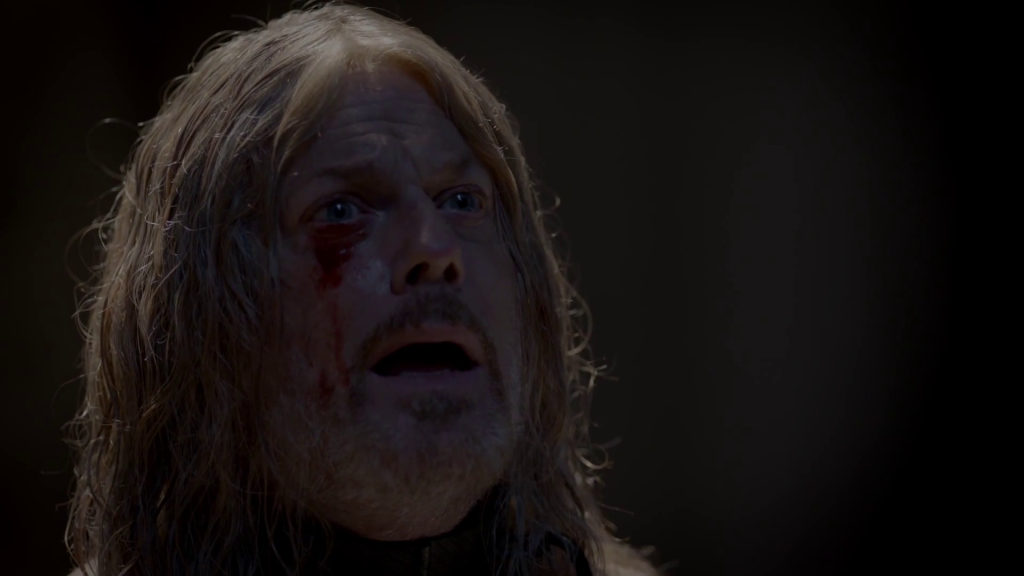
Furthermore, the two bigger crimes of the series are that, despite being produced by a network known for more mature, gritty material like FX, the pilot is remarkably tame and lacks any of the satirical themes or critiques the comics were known for. Aside from the occasional sex references and a lot of swearing, this series that, as far as I know, doesn’t have any real content restrictions, opts for material that could very easily be cut to show on network television. The lack of ambition and willingness to offend that this suggests also plays into the series’ utter lack of critique or social commentary. Throughout the comics, Bendis constantly draws reference to how the oversaturated media landscape that we in the 21st century are familiar with can do just as much harm as good in a world of superheroes. People die, lives are ruined, lies are spun, and the jobs of the main characters are often made more difficult for having to deal with the media. As far as I can tell, the Powers pilot acknowledges the presence of the media, but the portrayal lacks any of Bendis’ biting critique and is mainly used for exposition. It might as well have not been there at all.
While attempting to soar to new heights on television, Powers lands its pilot episode with a dull thud. Instead of using the vast, imaginative universe of the comics and the crass, graphic nature of the series and its themes, it opts to water everything down into a fairly generic cop procedural with low-end TV effects and a plot and cast of characters ripped straight from the Law and Order school of writing. Decent acting and a few interesting plot ideas does not do enough to save this generic waste of space for me. I can highly recommend the comic this series is based on, but so far Sony’s attempt at straight to video game console television seems to have fallen flat on its face. Not terrible, but too little of worth for a recommendation.

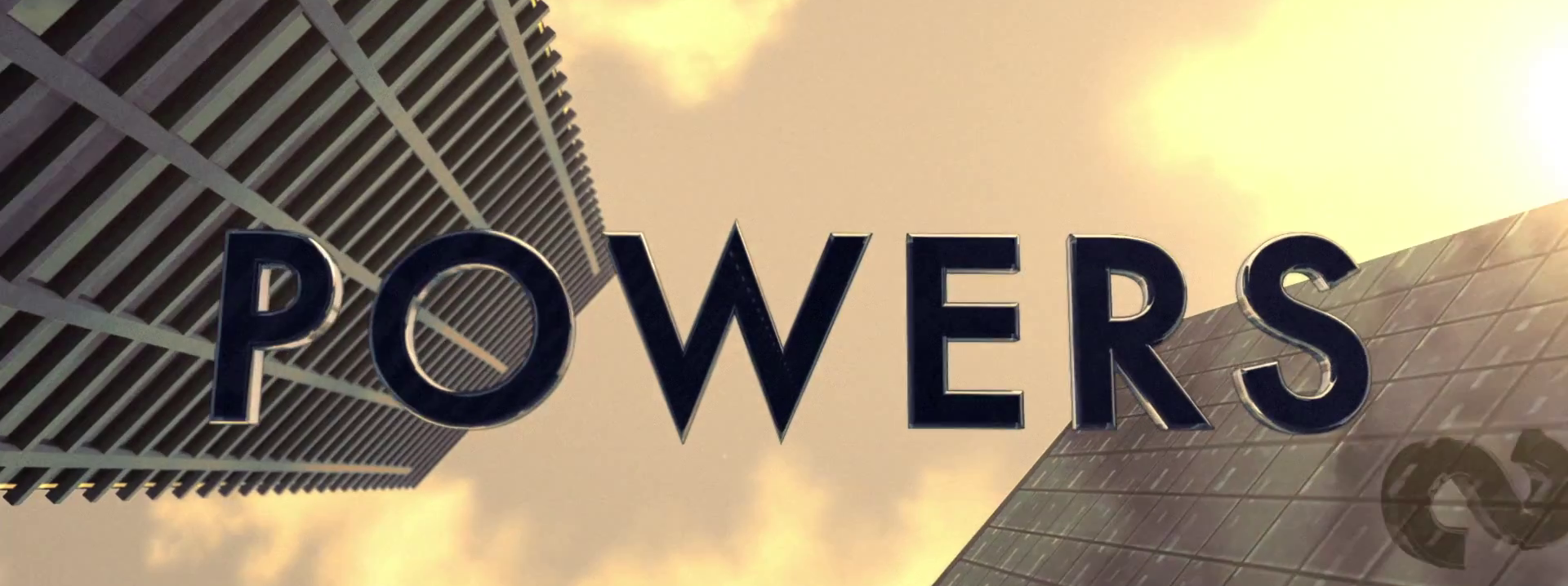
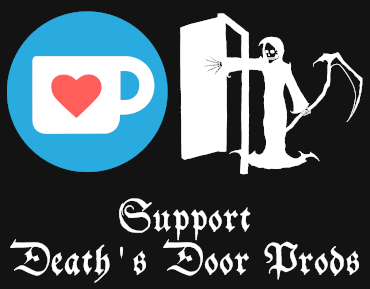

Add comment